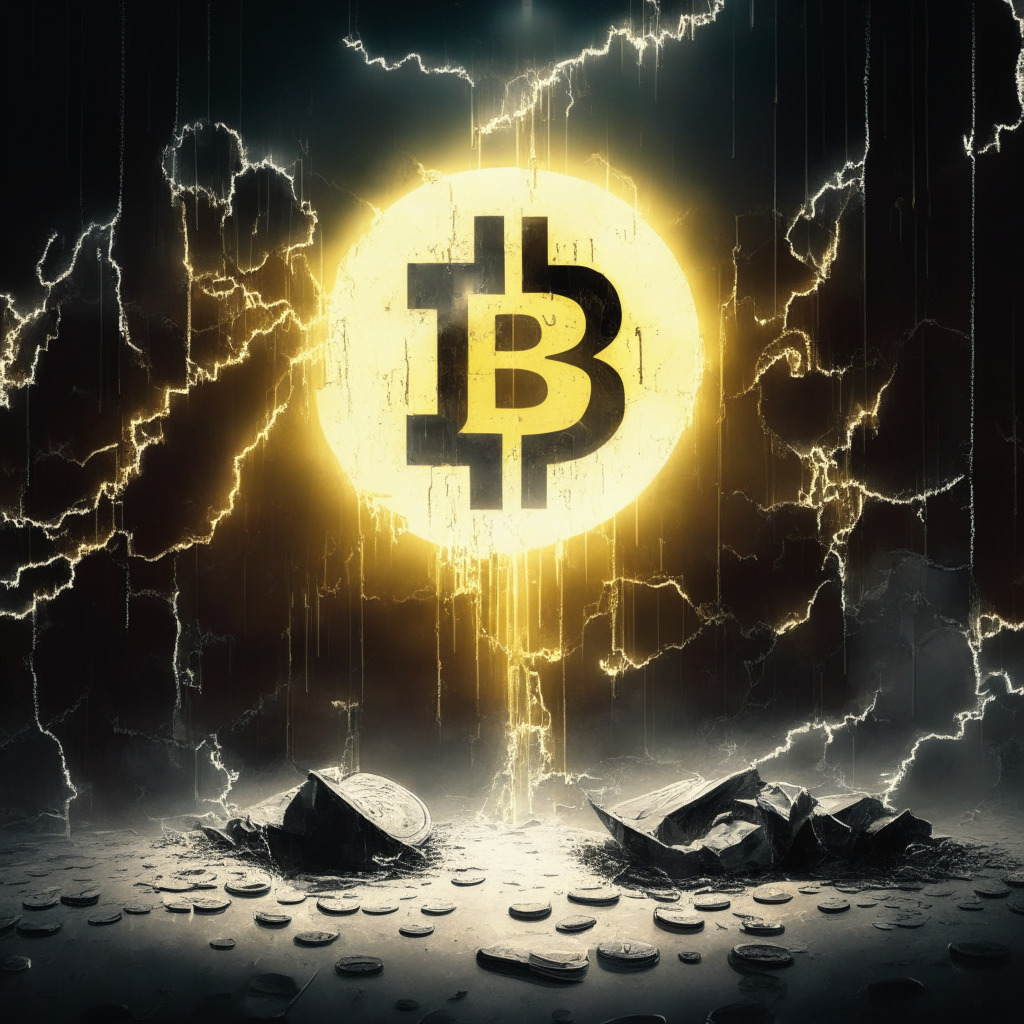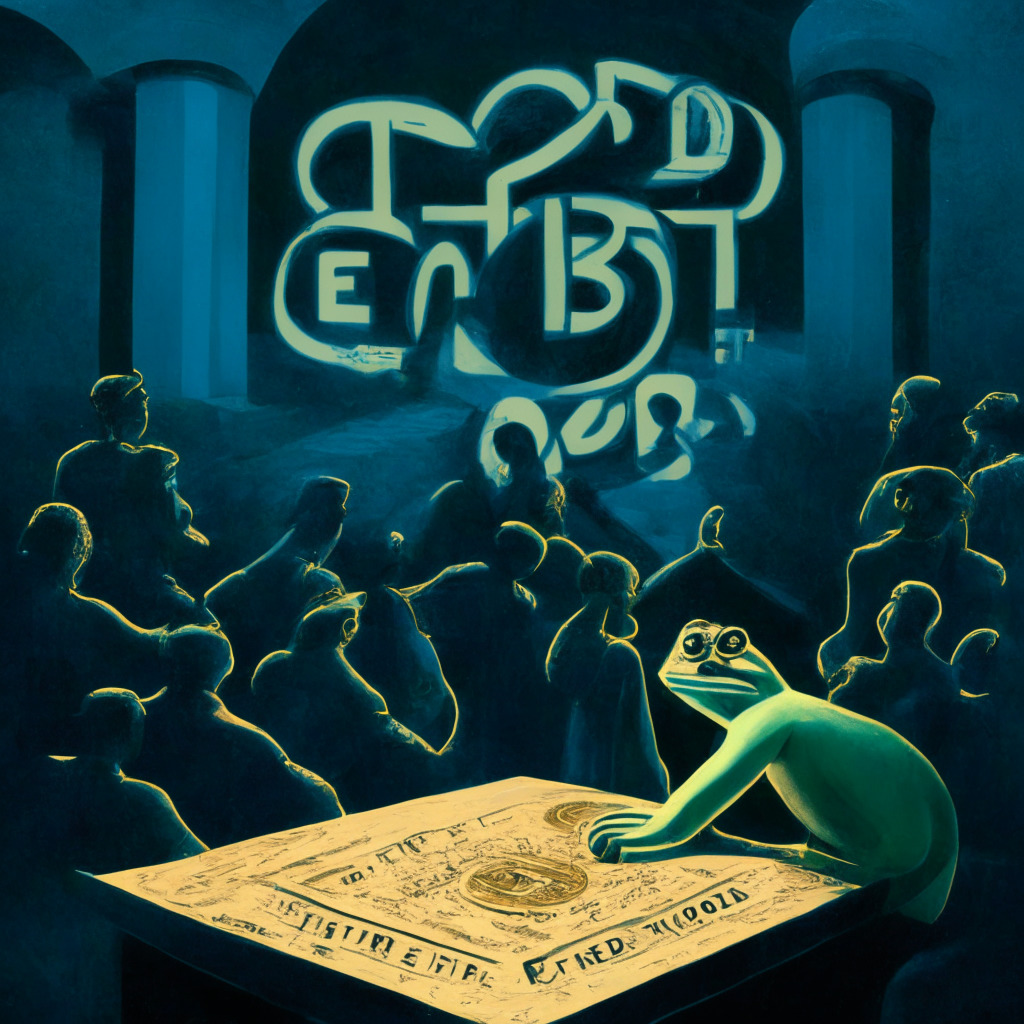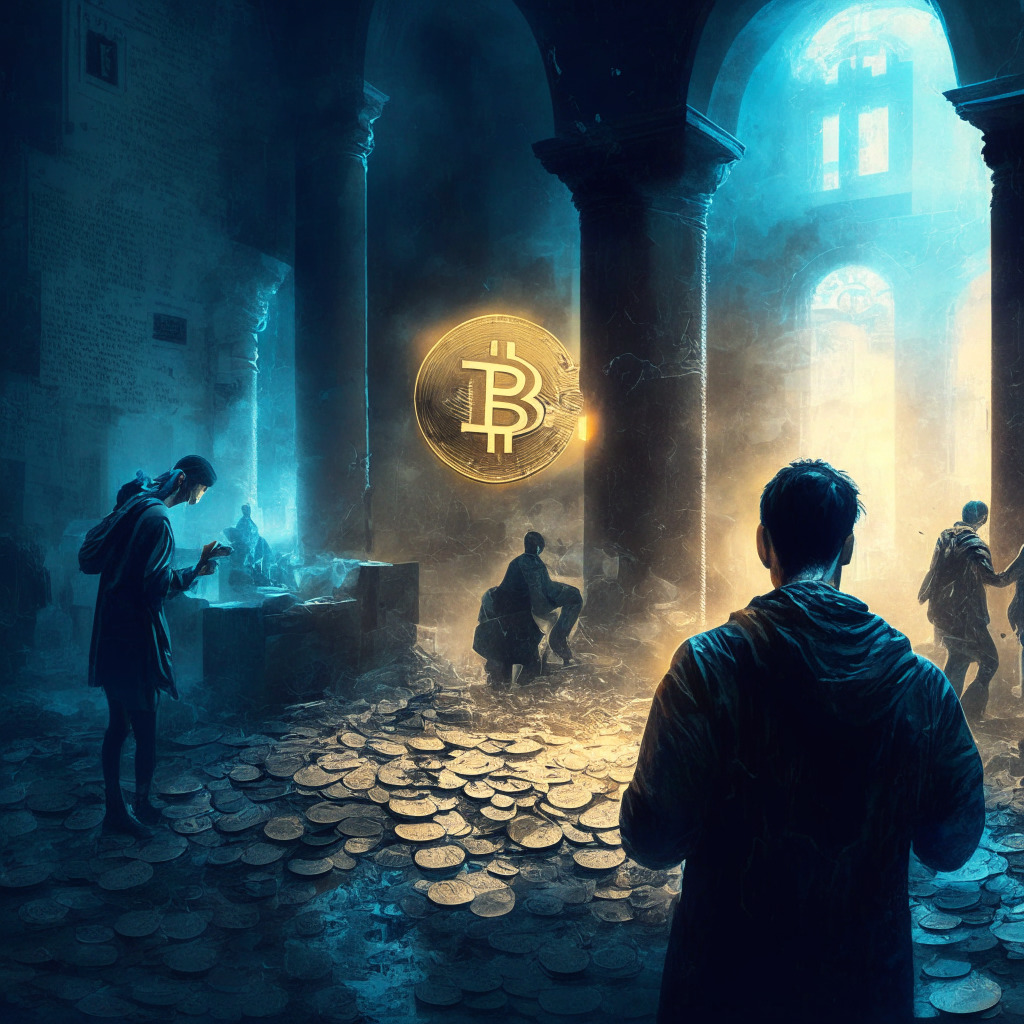Pseudonymous blockchain investigator ZachXBT faces a defamation lawsuit filed by entrepreneur Jeffrey Huang, whom he accused of embezzling $37.8 million worth of ETH from a defunct crypto treasury platform. The lawsuit, potentially impacting industry practices, raises questions about anonymity, transparency, and the future of blockchain sleuthing.
Search Results for: TRUTH
NFTs Meet Gaming in Viral Twitch Sensation: A New Era or a Risky Play?
Indie game “Only Up” features notable NFT project, Goblintown’s artwork and logos throughout the game, raising questions about future interactions between NFT projects, gaming, and the entertainment industry. The growing popularity of such games may encourage more crossovers, creating opportunities and challenges for creators and users.
Abra Accusations: Securing Crypto Investments Amidst Fraud and Insolvency Claims
The Texas State Securities Board accuses crypto lender Abra and founder William Barhydt of misleading the public, securities fraud, and insolvency. Regulators allege Abra offered investments with materially misleading statements targeting Texas investors and secretly transferred assets to Binance Holdings Limited. The safety of investors and users is at risk, and authorities aim to protect them by bringing these irregularities to public attention.
Uniswap v4 Launch Ignites Debate Over Business Source License and Open-Source Ethics
Uniswap’s decision to use a Business Source License (BSL) for its v4 release has sparked controversy within the Ethereum community, with critics arguing that it’s not truly open-source. The license allows public code access but restricts commercial or production use for four years before converting to a General Purpose License.
FTX Co-Founder’s Trial: Fraud or Mismanagement Debacle in Crypto Exchange Collapse
US prosecutors proceed with the trial of FTX co-founder Sam Bankman-Fried on original criminal charges amid ongoing litigations in The Bahamas. The case will examine the relationship between exchange founders, risk management, and the future of cryptocurrency exchange regulations, providing insights for entrepreneurs, enthusiasts, and detractors alike.
Binance Lawsuit & Liquidation Waterfall: Balancing Protection vs Growth in Crypto Market
The SEC’s lawsuit against Binance has raised concerns about the exchange’s alleged unethical practices. Accusations of a “liquidation waterfall” strategy have surfaced, but CEO Changpeng Zhao denies these claims. This situation highlights the need for transparency and robust regulations in the crypto industry.
Binance.US Liquidity Crisis: Regulatory Pressure vs Market Recovery
The recent SEC lawsuit against Binance.US highlights the growing regulatory scrutiny on crypto exchanges, causing a drop in liquidity and market share. Exchanges must invest in safety and transparency to retain trust and navigate the evolving crypto landscape amidst increasing regulations.
Roblox Bitcoin Mining Simulator Outshines Web3 Metaverse: A Curious Crypto Phenomenon
In the Roblox metaverse, Bitcoin Miner Beta allows users to simulate real-life bitcoin mining, gaining more popularity than actual cryptocurrency metaverse platforms. This raises questions about the popularity of Web3 metaverse projects and the future convergence between Web2 and Web3 gaming experiences.
Crypto Scams and Shadow Banking: Lessons from Reginald Fowler’s $700M Conviction
The Manhattan federal court convicted ex-Minnesota Vikings co-owner Reginald Fowler in a $700 million crypto scam, highlighting the dangers of unregulated cryptocurrency transactions and shadow banking activities. Fowler’s case emphasizes the need for government and regulatory action to prevent fraud and protect the stability of the financial system.
Constructive SEC Talks & Crypto Compliance: Balancing Innovation with Securities Laws
Crypto firms engage in constructive discussions with the SEC, focusing on aligning their business models with existing regulations. The SEC’s recent legal actions against crypto firms emphasize the importance of compliance, transparency, and proper disclosures to protect investors and maintain trust in the industry.
Crypto Scandals of 2022: Lessons Learned and the Path to Transparency
The collapse of major crypto companies, including FTX, due to weak balance sheets and intertwined operations, has fueled skepticism about crypto’s underlying technology. However, this highlights the need for increased transparency, accountability, and investigative journalism to maintain trust in the industry, ensuring future growth and stability.
The Dark Side of NFT Influencers: Responsibility, Scams, and Trust in Web3 Community
Social media influencers in the NFT space hold significant responsibility as their actions influence their audience’s decisions on buying or selling NFTs. This becomes problematic when they unintentionally promote scams, such as the recent Pixel Penguins NFT collection, raising questions about their role as trusted thought leaders in the crypto and NFT community.
Navigating Crypto Market Turbulence: Balancing Innovation, Stability, and Potential Pitfalls
The crypto market experiences significant price fluctuations, raising questions about long-term stability. Blockchain technology offers advantages like decentralization, transparency, and accessibility, but skepticism remains due to illicit activities, scams, and environmental impact. Striking the right balance between innovation and stability is crucial for crypto’s future.
Greenidge Generation: Surprising Local Support for Bitcoin Mining Facility
Greenidge Generation, a Bitcoin mining facility in New York, has won local support despite initial concerns about its environmental impact. Accurate information and engaging with local communities are key in shaping policy and perception of mining operations.
Bitcoin Spiral: Heading Towards $23k Amid US Debt Fears?
Bitcoin’s downward spiral nears $26,000 as it breaks through critical support levels, suggesting further correction. Crypto analyst Ali Martinez predicts a possible plummet to $23,000. With the US debt ceiling debate causing unease, investors must remain vigilant, conducting thorough market research before making decisions.
MetaMask Tax Controversy: Debunking Misconceptions and Clarifying Terms of Service
Accusations of MetaMask and its parent company, ConsenSys, collecting taxes on cryptocurrency transactions created controversy. However, the company clarified the claims resulted from a misreading of their terms of service, and they do not collect taxes on on-chain crypto transactions.
Crypto Advisor’s Battle with US Government: Uncovering Secrets or Damaging Credibility?
Criminal extortion charges against early Ethereum adviser Steven Nerayoff were dismissed by a New York judge amidst allegations involving a U.S. investigator setup. Nerayoff’s story raises questions about government actions against the crypto industry and highlights the importance of staying informed and practicing due diligence in this ever-evolving technological landscape.
French Bank Raid Exposes Flaws: How Blockchain Can Alleviate Fraud and Tax Evasion
The French fraud and money laundering case involving major banks highlights the challenges of determining shareholders responsible for paying taxes on dividends. Blockchain technology could offer a solution, providing a transparent, verifiable, and immutable single source of truth for capital markets, streamlining operations, reducing fraud, and enhancing trust and regulation.
South Korea Raid on Crypto Exchanges: Regulation vs. Market Growth Debate Heats Up
South Korean prosecutors raided crypto exchanges Upbit and Bithumb in connection with lawmaker Kim Nam-kuk’s digital assets investigation. Amid allegations of suspicious crypto dealings and resignation, South Korea continues efforts to regulate and monitor cryptocurrency activity, ensuring legal compliance and user safety.
South Korean Lawmaker’s Departure: Crypto Regulation vs Industry Growth Conflict
South Korean lawmaker Kim Nam-kuk departs from the Democratic Party amid allegations surrounding his crypto dealings. Nam-kuk faces accusations of liquidating $4 million worth of crypto assets before the implementation of the Travel Rule in March 2023. South Korea’s central bank recently gained authority to investigate crypto-related businesses, balancing regulation and industry growth.
Blurring the Lines: Checks Elements Combines NFTs and Hand-Drawn Art – A Harmonious Future?
Jack Butcher launches Checks Elements, combining generative art with hand-drawn physical prints in a 152-piece collection inspired by earth, fire, water, and air. Bridging digital and physical art, the collection connects Ethereum-based NFTs with Butcher’s authenticated monoprints.
Debunking Cardano’s Hydra Head 1 Million TPS Myth: Balancing Expectations and Reality
The launch of Hydra Head, a scaling solution for Cardano’s blockchain, has generated excitement about its potential to process 1 million transactions per second (TPS). However, Cardano’s Technical Director, Matthias Benkort, debunked this claim, urging reliance on official statistics for accurate information on Hydra Head’s capabilities.
Linda Yaccarino as Twitter CEO: Impact on Crypto and Blockchain Industries Explained
Recent reports suggest that Linda Yaccarino, NBCUniversal’s Chair of Global Advertising and Partnerships, could become Twitter’s CEO, affecting the platform’s approach to international discourse and digital assets. A leadership change at Twitter may contribute to the overall growth of crypto and blockchain industries. As we await official confirmation, the crypto community remains cautiously optimistic about the new CEO’s potential impact.
Terraform Labs Co-Founder’s Arrest & Impact on Crypto Industry: Analyzing the Case
Terraform Labs co-founder, Do Kwon, has been released on bail amidst ongoing legal proceedings involving allegations of forging travel documents. Kwon’s case highlights the importance of transparency and regulatory compliance in the crypto space as the industry faces increased scrutiny.
Coinbase’s PEPE Token Controversy: Separating Crypto Analysis from Cultural Baggage
Coinbase’s chief legal officer issued an apology regarding a controversial newsletter focused on the PEPE token, which critics say overlooked the Pepe meme’s controversial aspects tied to racism and hateful symbols. The debate highlights the challenge of balancing accurate reporting and acknowledging cultural issues in the crypto industry.
ParaSpace Drama: Internal Conflict, Missing Funds, and the Battle for Control
The nonfungible tokens protocol ParaSpace is embroiled in an internal conflict, as developers accuse CEO Yubo Ruan of mismanaging 2,909 ETH worth of recovered funds, while Ruan alleges an “illegal takeover” by former consultants. The situation underscores the importance of accountability, transparency, and mutual understanding within crypto projects to maintain trust and stability.
The Billionaire Hero of Blockchain: Savior or Cautionary Tale for Crypto’s Future?
The narrative of Sam Bankman-Fried (SBF) as a modern-day Carnegie using blockchain wealth for good raises questions about the need for a “hero” in the crypto world. Instead, we should focus on fostering collective efforts for equitable wealth distribution and sustainable development in blockchain technology.
Sudden $57M Token Influx to Alameda Research Wallets: Questions Arise or Growing Pains?
Alameda Research wallets, controlled by the FTX Bankruptcy Estate, have received over $57 million of tether (USDT) and $300,000 worth of mask (MASK) tokens, sparking curiosity and concern. Further investigation and transparency are needed to quell any potential fears for those affected.
NFT Security Threats: Safeguarding Collectibles Amid Platform Closures and Hacks
In the volatile world of NFTs, events like marketplace bankruptcy and hacks expose the shaky trust assumptions and risks surrounding asset security. Blockchain companies are developing solutions, but assets connected to blockchains are never completely secure. User education, technological development, and proactive risk mitigation are essential for safeguarding collectors’ assets.
Alibaba’s Metaverse Launchpad and Web3’s Impact on Mainstream Industries: Embracing or Warning?
Major Web2 players, including Alibaba and Sports Illustrated, are entering the Web3 space, launching metaverse and NFT platforms on blockchains like Avalanche and Polygon, signaling growing interest and integration of Web3 technology into mainstream experiences.
Texas Crackdown on AI Crypto Scams: How to Protect Yourself and Recognize Red Flags
The Texas State Securities Board’s cease and desist order against promoters of TruthGPT Coin and Elon Musk AI Token highlights potential pitfalls in the crypto market. Investors are urged to remain vigilant against scams capitalizing on public interest in AI and crypto, particularly those made by unidentified individuals online.
Crypto Kids vs Andrew Tate: Hypocrisy, Scams, and the Battle for Crypto Legitimacy
A recent Twitter thread by Andrew Tate criticized young crypto enthusiasts who profited during the 2021 crypto boom, mainly through questionable coins and NFTs. However, Tate’s hypocrisy lies in operating a controversial online course, Hustler’s University, teaching money-making techniques similar to the crypto profits he condemns.































